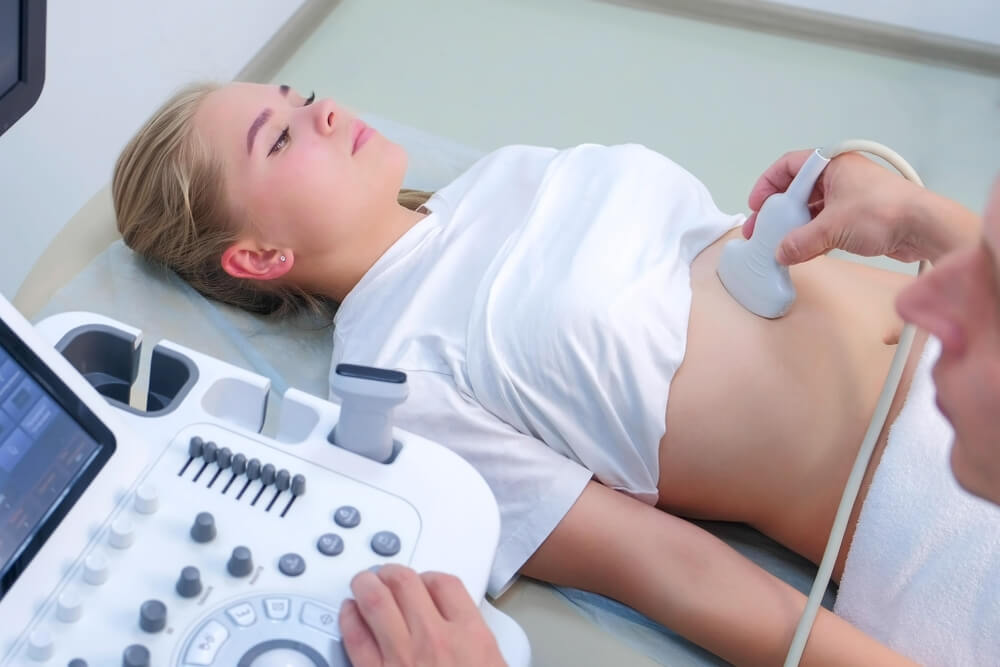Edit Content
What Can a Liver Ultrasound Show?
A liver ultrasound is a non-invasive imaging test that provides detailed visuals of your liver and surrounding structures. This diagnostic tool helps healthcare providers assess liver health, detect abnormalities, and monitor existing conditions. But what exactly can a liver ultrasound show? Let’s explore its capabilities in more detail.
Understanding Liver Ultrasound Imaging
Liver ultrasound uses high-frequency sound waves to create images of the liver. The test is painless and does not involve radiation, making it a safe and effective method for evaluating liver health. During the procedure, a trained technician moves a transducer over your abdomen to capture real-time images of your liver, bile ducts, and blood vessels. These images help doctors diagnose a range of liver conditions and guide further medical decisions.
Get in touch with us!
How to Prepare for a Liver Ultrasound
Preparation for a liver ultrasound may vary depending on your healthcare provider’s instructions, but general guidelines include:
- Fasting for at least 6-8 hours before the exam to reduce interference from gas in the intestines.
- Drinking water if necessary but avoiding carbonated beverages.
- Wearing comfortable clothing to allow easy access to the abdomen.
- Informing your doctor about any existing medical conditions or medications that might affect the imaging results.
Common Liver Conditions a Ultrasound Can Detect
1. Fatty Liver Disease (Hepatic Steatosis)
Liver ultrasounds can detect excessive fat buildup in the liver, a common sign of non-alcoholic fatty liver disease (NAFLD) or alcoholic liver disease. Fatty liver can develop due to obesity, diabetes, high cholesterol, or excessive alcohol consumption. Early detection can help guide lifestyle changes and medical interventions to prevent further liver damage.
2. Liver Cirrhosis
This test can identify scarring or fibrosis of the liver, which is commonly caused by chronic liver disease, hepatitis, or long-term alcohol use. Cirrhosis can lead to severe complications such as liver failure, portal hypertension, and an increased risk of liver cancer. Regular monitoring with ultrasound can help track disease progression and inform treatment decisions.
3. Liver Tumors and Cysts
Ultrasounds can reveal benign cysts, hemangiomas, or potentially cancerous growths. If an abnormal mass is detected, further testing, such as a CT scan, MRI, or biopsy, may be recommended. Detecting liver tumors early can significantly improve treatment outcomes.
4. Liver Enlargement (Hepatomegaly)
A liver ultrasound can measure liver size and detect enlargement, which may be linked to infections, heart disease, metabolic conditions, or liver inflammation. An enlarged liver could indicate underlying health issues such as fatty liver disease, hepatitis, or congestive heart failure.
5. Liver Abscesses or Infections
Pockets of infection or abscesses within the liver can be identified through ultrasound, aiding in prompt diagnosis and treatment. Liver abscesses can develop due to bacterial infections, parasites, or conditions such as appendicitis or diverticulitis that spread infections to the liver.
6. Bile Duct Obstructions
Ultrasound imaging can detect blockages or narrowing of the bile ducts, which may be caused by gallstones, tumors, or inflammation. Bile duct obstruction can lead to jaundice, liver damage, and infection if left untreated. Ultrasound is a key tool in diagnosing these issues and determining the need for further intervention, such as ERCP or surgery.
7. Vascular Abnormalities
A Doppler ultrasound can assess blood flow in the liver, helping to diagnose conditions such as portal hypertension, thrombosis, or other vascular issues affecting liver function. Proper blood circulation is essential for liver health, and Doppler ultrasound provides critical information about any abnormalities.
When Should You Get a Liver Ultrasound?
A liver ultrasound may be recommended if you experience symptoms such as:
- Persistent abdominal pain or discomfort
- Jaundice (yellowing of the skin and eyes)
- Unexplained weight loss
- Swelling in the abdomen
- Dark urine or pale stools
- Fatigue or weakness
- Elevated liver enzyme levels in blood tests
Additionally, people with risk factors such as obesity, diabetes, excessive alcohol consumption, or a family history of liver disease may benefit from regular liver ultrasound screenings.

Benefits of Early Detection with Liver Ultrasound
Early detection of liver conditions through ultrasound can:
Prevent severe complications
Identifying issues like cirrhosis or bile duct obstructions early allows for prompt intervention before they worsen.
Improve treatment effectiveness
Timely detection of liver disease enables doctors to implement effective treatment plans that slow disease progression.
Reduce healthcare costs
Managing conditions early often prevents the need for costly procedures or hospitalizations.
Enhance quality of life
Knowing the state of your liver health allows you to take proactive steps toward a healthier lifestyle.
Why Choose Fairbanks Ultrasound?
At Fairbanks Ultrasound, we offer state-of-the-art ultrasound imaging with expert technicians dedicated to providing accurate and timely results. Our team uses advanced ultrasound technology to ensure high-quality imaging and precise diagnoses. Whether you’re experiencing symptoms of liver disease or need routine monitoring, we are here to help.
The Fairbanks Ultrasound Advantage:
- Experienced Sonographers – Our certified ultrasound technicians are trained to perform liver ultrasounds with precision and care.
- Advanced Imaging Technology – We use modern ultrasound equipment to capture clear and detailed liver images.
- Compassionate Care – We prioritize patient comfort and ensure a stress-free imaging experience.
- Quick & Accurate Results – Timely results help guide treatment and next steps in your healthcare journey.
- Convenient Scheduling – We offer flexible appointment times to accommodate your needs.
Schedule Your Liver Ultrasound Today!
Early detection is key to effective liver disease management. If you have concerns about your liver health, don’t wait—schedule your liver ultrasound with Fairbanks Ultrasound today. Call us now or visit our contact page to learn more!
Do you need help right away?
No problem! Call Us Now.
Fairbanks Ultrasound is a local center in Fairbanks, Alaska that offers various ultrasound services for pregnancy, gynecology, thyroid, vascular, and general purposes.

